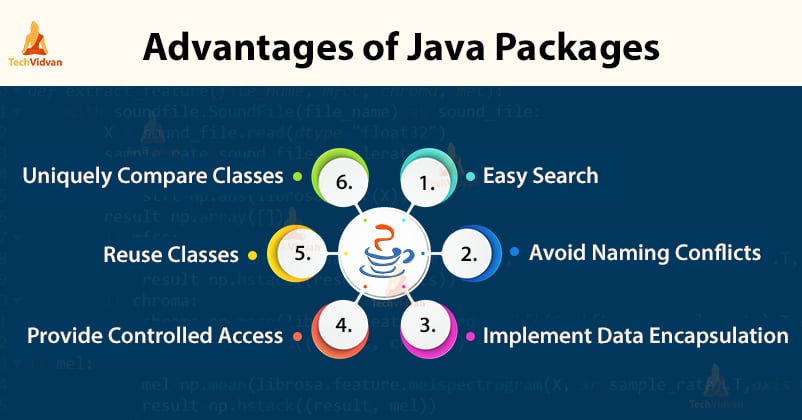Advantages of Packages in Java

Packages in Java offer several advantages that contribute to better organization, modularity, and maintainability of code. Here are some key advantages of using packages in Java:
-
Namespace Management:
- Packages provide a way to organize classes and interfaces into named namespaces. This helps prevent naming conflicts, as classes with the same name can exist in different packages without ambiguity.
-
Modularity:
- Packages facilitate modularity by allowing developers to group related classes and interfaces together. This modularity enhances code organization and makes it easier to manage and understand large codebases.
-
Encapsulation:
- Packages support the encapsulation of classes and their members. Classes with default (package-private) or private access modifiers are accessible only within the same package, restricting external access and promoting encapsulation.
-
Access Control:
- Packages enable access control by defining visibility boundaries. Classes and members marked as "package-private" are accessible only within the same package, while those marked as "public" can be accessed from outside the package.
-
Code Reusability:
- Packages promote code reusability by allowing related classes to be grouped together. This makes it easier to reuse and share code across different projects or modules.
-
Maintenance and Organization:
- Packages contribute to better code organization, making it easier to locate and manage classes and resources. This is especially beneficial in large projects with numerous classes and components.
-
Versioning and Distribution:
- Packages support versioning and distribution of code. Developers can create JAR (Java Archive) files containing compiled classes organized into packages, making it convenient to distribute and manage libraries or components.
-
Import Statements:
- The use of import statements in Java allows for selective import of classes and packages, reducing namespace pollution and making the code more concise.
-
Ease of Understanding:
- Well-designed packages with meaningful names contribute to the readability and understanding of the codebase. It becomes easier for developers to comprehend the structure and purpose of the classes within a package.
-
Encourages Best Practices:
- The use of packages encourages the adoption of best practices in software development, such as proper organization, encapsulation, and access control. This promotes the creation of maintainable and scalable code.
In summary, packages in Java play a crucial role in organizing, encapsulating, and managing code, leading to improved modularity, readability, and maintainability. They are a fundamental feature of Java's design that supports the development of robust and scalable applications.
Thank you,
